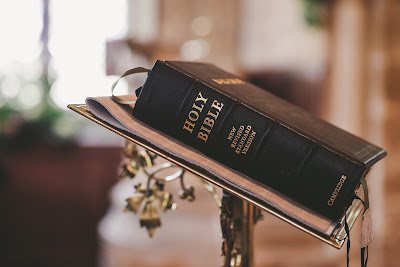Something that struck me again, in revisiting Bonhoeffer's life, was how the daily worship established at Finkenwalde, mainly the reading of the Bible, the Psalms especially, as described in Life Together, sustained Bonhoeffer and the Finkenwalde community in their resistance to Hitler and the Nazi regime.
I also took note again how Bonhoeffer's exposure to the Black church, during his time worshipping and serving at Abyssinian Baptist Church in Harlem, proved to be a decisive moment in his spiritual life.
As I reflected upon how hearing the Word of God sustained both the Nazi resistance and the Black church in America, it dawned upon me just how subversive the Bible is to any political arrangement. Throughout history, the Bible has always functioned as resistance literature.
The Bible unsettles political systems in three related ways.
First, and most crucially, the Bible denies the ultimacy of any political system. By unsettling the ultimacy of any king, ruler, nation, or political party, the Bible troubles any demand for unconditional allegiance to flag, nation, people, or homeland.
Second, the prophetic tradition of the Bible trains its readers in calling out and decrying injustice and oppression. Scripture is a school for prophets.
Lastly, the Biblical themes of God's emancipation and rescue, both political and spiritual, instill and sustain liberationist desires, hopes and dreams. Just attend to how the Exodus story affected the imagination of the Black church in America. There's a reason Harriet Tubman was called "Moses."
The point to be observed here is that, no matter where the Bible is read, it's going to unsettle political arrangements, especially oppressive arrangements. Wherever the Word of God is heard dreams of freedom will be dreamed and sustained, prophets will be trained and galvanized, and ultimate allegiances to the state challenged and withheld.
All of this makes me wonder if all this isn't simply what political theology is and should be. We wrestle a lot about how the church should relate to the state, or how Christians should relate to politics. We debate different visions of what this should look like, from the Christian nationalists to the Christian anarchists. All sorts of competing political visions are debated and argued about. But I wonder if "the political vision of the Bible" is simply what I've describe above. The Bible provides no clear, specific picture about how to relate to the state or politics. Rather, the Bible does deeper work in persistently unsettling and challenging every human political project.
Simply put: No nation state, political revolution, or political party is safe so long as a copy of the Bible exists upon on earth. This existential challenge posed by the Bible to the state may be exactly and entirely the point of its political vision. To unsettle the nations. That is the political theology of the Bible.


